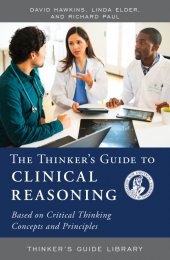The Thinker's Guide to Clinical Reasoning Based on Critical Thinking Concepts and Tools
David Hawkins, Linda Elder, and Richard Paul
Contact Info for Bloomsbury:
- For questions about orders you have already placed, email weborders@mpsvirginia.com or telephone 888-330-8477, ext. 7527.
- For questions about eBook purchases or pre-orders, email contact@bloomsbury.com.
- For general enquiries not related to online orders, call 1 212-419-5300 or email contact@bloomsbury.com.
The Thinker’s Guide to Clinical Reasoning introduces healthcare students and professionals to the foundations of critical thinking and offers examples of applications within clinical fields. It is not enough for healthcare workers to have access to data and research, they must also know how to analyze and process information to guide patients in making the best decisions about their health. This process requires critical thinking skills often ignored in healthcare curricula.
This book is an essential companion for all healthcare courses as it advances critical thinking within all specialties with the clinical professions.
As part of the Thinker’s Guide Library, this book advances the mission of the Foundation for Critical Thinking to promote fairminded critical societies through cultivating essential intellectual abilities and virtues across every field of study across the world.
Rowman & Littlefield Publishers / The Foundation for Critical Thinking
Pages: 58 • Trim: 6 x 8
978-0-944583-42-5 • Paperback • January 2010
978-1-5381-3387-3 • eBook • June 2019
Series: Thinker's Guide Library
$25.20
Additional Information About:
The Thinker's Guide to Clinical Reasoning Based on Critical Thinking Concepts and Tools
Clinical reasoning can be defined as thinking through the various aspects of patient
care to arrive at a reasonable decision regarding the prevention, diagnosis, or
treatment of a clinical problem in a specific patient. Patient care includes history
taking, conducting a physical exam, ordering laboratory tests and diagnostic
procedures, designing safe and effective treatment regimens or preventive strategies,
and providing patient education and counseling.
Obviously, the clinician should be well grounded in biomedical and clinical
sciences and skillful at gathering clinical data from a patient before engaging in
the process of clinical reasoning. This guide does not address the knowledge and
skills required to competently gather and interpret clinical data. Rather, the guide is
intended to help clinicians take the next step, which is determining the best course
of action to take based on what is known or what can reasonably be hypothesized from
clinical data. So, it isn’t enough to have a strong background in biomedical sciences
or to possess excellent clinical knowledge, nor to know how to conduct a history and
physical exam on a patient, or even to know how to formulate a differential diagnosis
given the signs, symptoms, and test results of a patient.
n addition to all of this, there is still a need to think critically about all the
important information pertaining to a particular case and to formulate or synthesize
a rational plan of action. In short, clinical reasoning requires critical thinking skills,
abilities and traits which are often not taught in schools and colleges for the health
professions.
This guide focuses on a framework for critical thinking relevant to all domains of
human thought and is specifically focused on clinical reasoning. The suggestions and
conclusions herein are consistent with the suggestions and conclusions found in the
works of prominent thinkers in the clinical fields.
